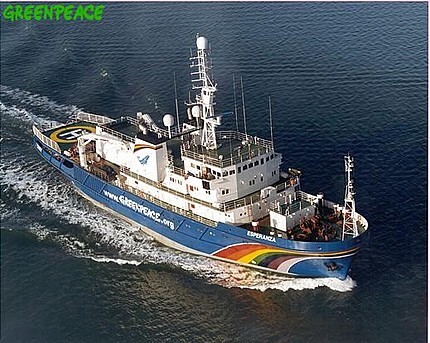hankyoreh
Links to other country sites 다른 나라 사이트 링크
Anti-nuke activists barred from entry to South Korea

By Nam Jong-young, staff writer
The international environmental NGO Greenpeace is responding actively after group members were barred from entering South Korea as part of an anti-nuclear campaign. The organization is currently planning to lodge a complaint with the United Nations Human Rights Council (UNHRC) over the decision.
The Justice Ministry refused entry to three staffs attempting to enter South Korea on Monday, including Mario D'Amato, head of Greenpeace's East Asia chapter; Fung Ka Keung, regional development director for East Asia; and Rashid Kang, manager for Greenpeace Seoul. The three staff were detained at the airport at the request of the Justice Ministry which cited “potential threats to the public interest" at Incheon International Airport on Monday and send them back to Hong Kong. Greenpeace International executive director Kumi Naidoo only was allowed entry to South Korea. He told the Hankyoreh in a Tuesday interview that an official request had been made for an audience with the Justice Minister to hear an explanation.
Naidoo added that the group plans to raise the issue with the UNHRC if the Justice Minister fails to give a satisfactory explanation. Calling the ban a clear human rights violation, Naidoo noted that the UNHRC presented an opinion that recent legal measures taken by the Japanese government on Greenpeace activity violated the International Covenant on Civil and Political Rights.
The Justice Ministry argued that the activists presented "potential threats to the public interest." Naidoo was scheduled to accompany them on a visit to Seoul Mayor Park Won-soon to discuss the city's plans to eliminate a nuclear power plant and on preparations for a mid-April campaign to tour current and scheduled nuclear power plant sites such as Samcheok, Gangwon province, on board the Greenpeace vessel the Esperanza.
Naidoo said the staffs did not come to South Korea to harm the public interest and voiced suspicions that the government is uncomfortable with Greenpeace's efforts to win support for an alternative to nuclear power. He also said personal information could be provided for the three people denied entry and called on the South Korean government to quickly remove them from the entry ban list before it damages the country's international image.
Previously, the government drew objections from environmental groups in the lead up to the Nuclear Security Summit when its refusal to admit No Nukes Asia Forum secretary-general Daisuke Sato was followed by the use of police vehicles to chase off a Japanese environmental activist who entered via Busan Harbor on Mar. 18.
The next question is whether it will admit the Esperanza, which is scheduled to arrive in South Korea in mid-April for an anti-nuclear campaign.
Please direct questions or comments to [english@hani.co.kr]
Editorial・opinion
![[Column] Has Korea, too, crossed the Rubicon on China? [Column] Has Korea, too, crossed the Rubicon on China?](https://flexible.img.hani.co.kr/flexible/normal/500/300/imgdb/original/2024/0419/9317135153409185.jpg) [Column] Has Korea, too, crossed the Rubicon on China?
[Column] Has Korea, too, crossed the Rubicon on China?![[Correspondent’s column] In Japan’s alliance with US, echoes of its past alliances with UK [Correspondent’s column] In Japan’s alliance with US, echoes of its past alliances with UK](https://flexible.img.hani.co.kr/flexible/normal/500/300/imgdb/original/2024/0419/2317135166563519.jpg) [Correspondent’s column] In Japan’s alliance with US, echoes of its past alliances with UK
[Correspondent’s column] In Japan’s alliance with US, echoes of its past alliances with UK- [Editorial] Does Yoon think the Korean public is wrong?
- [Editorial] As it bolsters its alliance with US, Japan must be accountable for past
- [Guest essay] Amending the Constitution is Yoon’s key to leaving office in public’s good graces
- [Editorial] 10 years on, lessons of Sewol tragedy must never be forgotten
- [Column] A death blow to Korea’s prosecutor politics
- [Correspondent’s column] The US and the end of Japanese pacifism
- [Guest essay] How Korea turned its trainee doctors into monsters
- [Guest essay] As someone who helped forge Seoul-Moscow ties, their status today troubles me
Most viewed articles
- 1[Column] The clock is ticking for Korea’s first lady
- 2Hong Se-hwa, voice for tolerance whose memoir of exile touched a chord, dies at 76
- 3After 2 months of delayed, denied medical care, Koreans worry worst may be yet to come
- 4[Column] Has Korea, too, crossed the Rubicon on China?
- 5US overtakes China as Korea’s top export market, prompting trade sanction jitters
- 6[Correspondent’s column] In Japan’s alliance with US, echoes of its past alliances with UK
- 7All eyes on Xiaomi after it pulls off EV that Apple couldn’t
- 8Samsung barricades office as unionized workers strike for better conditions
- 9[Photo] Smile ambassador, you’re on camera
- 10[Correspondent’s column] The US and the end of Japanese pacifism